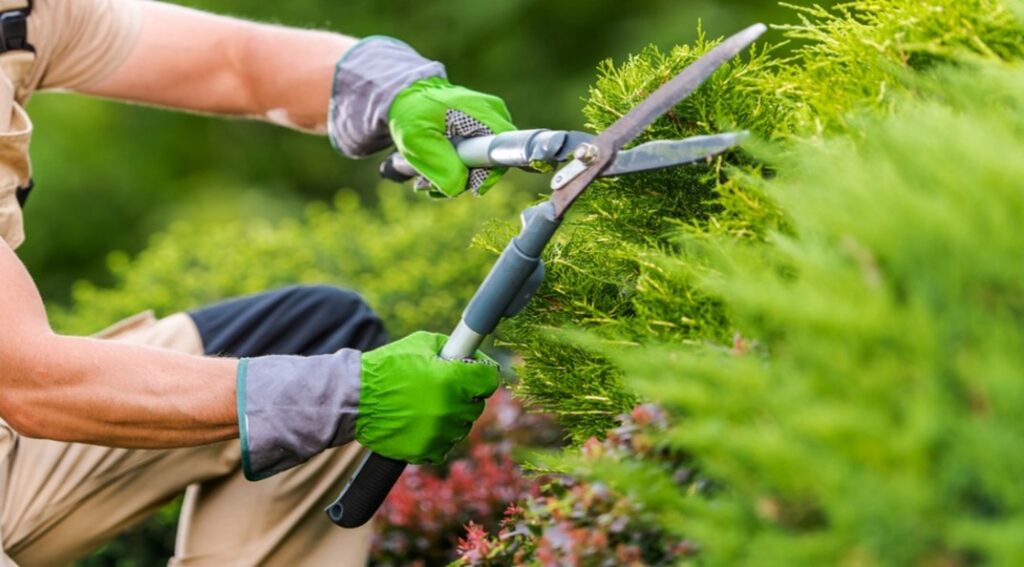Written by Glenna Gonzalez, Professional Marketer and Public Relations

Starting a small-scale gardening business can be a rewarding venture, as long as you know what you’re doing.
Just like any other business venture, there are a multitude of steps that you’ll need to account for to keep your business on the up-and on the path to success. Here’s a step-by-step guide to help you get started.
The 9 Steps to Starting a Profitable Gardening Business
1. Research and Planning
Market Research : Before diving into your gardening business, it’s crucial to conduct thorough market research. Identify your target market by considering factors such as demographics, income levels, and lifestyle preferences.
Understand the demand for gardening services in your area and analyze competitors. Identify gaps in the market that your business can fill.
Additionally, consider seasonal trends and how they may impact your business throughout the year. This information will help you tailor your services to meet the specific needs of your local community.
Business Plan : Once you have a clear understanding of the market, create a detailed business plan.
This plan should include your business goals, a description of the services you’ll offer, your target market, and a comprehensive analysis of your financial projections. Obtain the proper Accounting Software when the time is right.
Outline your marketing strategy, including how you will promote your services and attract customers.
Define your unique selling proposition (USP) – what sets your gardening business apart from the competition. A well-thought-out business plan will help your business and help you secure funding if needed.
Regularly revisit and update your plan as your business evolves.
2. Legal Considerations
Business Structure : Choose a legal structure for your gardening business, such as a sole proprietorship, partnership, LLC, or corporation.
Each business structure has its own advantages and disadvantages in terms of liability, taxes, and management.
Legal or financial professionals can determine the most suitable option for your specific situation.
Register your business with the appropriate authorities and obtain an Employer Identification Number (EIN) if necessary.
You can find out how to apply for an IRS EIN/ Tax ID Number here.
Permits and Licenses : Research and comply with local regulations regarding permits and licenses for operating a gardening business. Requirements may be different based on your location and the nature of your services.
Common permits include business licenses, environmental permits, and possibly zoning permits if you’re planning to operate from a specific location.
Failing to obtain the necessary permits can result in fines and legal complications, so it’s crucial to address this aspect before launching your business.

3. Name and Branding
Choosing a Business Name : Selecting a memorable and relevant business name is a crucial step in establishing your brand identity.
Ensure that the name is easy to spell, pronounce, and reflects the nature of your gardening business. Check the availability of the chosen name to avoid any legal issues.
You may want to incorporate elements that convey a sense of professionalism, reliability, or environmental friendliness, depending on your business values.
Once you have a name, register it to protect your brand.
Branding Your Gardening Business : Building a strong brand is essential for attracting and retaining customers.
Develop a simple yet distinctive logo that represents your business visually.
Choose a color scheme that aligns with the natural and vibrant aspects of gardening.
Consistency is key across all branding materials, including business cards, flyers, and your online presence.
Craft a compelling tagline that succinctly communicates your unique value proposition.
Your brand should evoke a positive and trustworthy image, encouraging potential clients to choose your services over competitors.
4. Services Offered
Defining Your Services : Clearly articulate the range of gardening services your business will provide.
This may include lawn care, landscaping, garden design, plant installation, and maintenance.
To differentiate your business, consider specializing in a particular area, such as sustainable gardening practices, organic gardening, or specific plant types.
Meet the needs of your target market, whether that involves catering to residential clients, commercial properties, or a combination of both.
Offering a diverse yet specialized set of services can attract a broader customer base.
Niche Specialization : Consider specializing in a niche within the gardening industry.
This could involve focusing on specific types of plants, such as native plants or edible gardens, or providing specialized services like organic pest control or sustainable landscaping.
Niche specialization can set your business apart, attract a specific clientele, and position you as an expert in a particular area.
Conduct market research to identify potential niches that align with local demand and your expertise.
Once you’ve identified a niche, incorporate it into your branding and marketing materials to highlight the unique value you bring to clients in that specific area.
Building a reputation as a specialist can lead to increased demand and customer loyalty.
Helpful Associations Related to Gardening:
- National Association of Lanscape Professionals
- Organic Landscape Association
- Nursery & Landscape Association Executives of North America
- American Nursery and Landscape Association

5. Supplies and Equipment :
Determining Necessary Supplies : Compile a comprehensive list of gardening supplies and equipment required for your business operations.
This may include basic tools like shovels, pruners, and watering cans, as well as more specialized equipment like lawn mowers, trimmers, and soil testing kits.
Consider the scale of your gardening business and the types of services you offer when determining the quantity and quality of supplies needed.
Establish relationships with reliable suppliers to ensure a steady and cost-effective source for your materials. Bulk purchasing may provide cost savings, so explore opportunities for discounts or wholesale arrangements.
Storage and Maintenance : Adequate storage space is essential for organizing and maintaining your gardening supplies and equipment.
Ensure that your storage area is secure, weather-resistant, and well-organized to streamline your operations. Regular maintenance of tools and equipment is crucial for longevity and efficient service delivery.
Develop a schedule for cleaning, sharpening, and repairing your tools to prevent downtime and ensure that they remain in optimal working condition.
Investing in quality equipment upfront can save money in the long run by reducing repair and replacement costs, as well as improving the quality of your services.
6. Pricing Strategy :
Determining Pricing Structure : Establishing a clear and competitive pricing structure is essential for the success of your gardening business.
Consider factors such as the cost of supplies, labor, and overhead when determining your pricing. Research the rates charged by competitors in your area to ensure that your prices are competitive.
Factor in the value of your expertise, specialized services, and any unique offerings when setting your prices.
It’s also beneficial to offer different service packages to cater to various customer needs and budgets. Be transparent about your pricing.
Promotions and Discounts : Consider implementing promotions and discounts using a service like Outgrow to attract new customers and encourage repeat business. Seasonal promotions, referral discounts, or bundled services can be effective strategies.
However, ensure that discounts or promotions allow your business to maintain profitability.
Regularly review and adjust your pricing strategy based on market trends, changes in costs, and the overall performance of your business.
Communicate the value of your services to customers, emphasizing the quality, reliability, and expertise your gardening business brings to the table.
This can justify your pricing and set realistic expectations for your clients.

7. Business Location
Setting Up a Physical Location: Depending on the scale and nature of your gardening business, you may need a physical location, such as a storefront or office.
This could be a space where clients can visit for consultations or a central hub for your operations. The location should be easily accessible and complies with local zoning regulations.
If you’re operating from home, create a dedicated workspace that is organized and separate from personal living areas.
A professional and well-maintained physical location can enhance your business’s credibility and make a positive impression on clients.
Storage and Equipment Facilities: If your gardening business involves storing equipment and supplies, allocate sufficient space for storage.
Invest in sturdy shelving units and storage solutions to keep everything organized.
Proper storage improves efficiency and prolongs the life of your tools and equipment. Additionally, consider a secure parking area if you have a fleet of vehicles.
If your business operates from a specific location, make sure it’s equipped with the necessary utilities and amenities to support your daily operations.
A well-organized and functional space contributes to the overall professionalism of your gardening business.

8. Online Presence
Creating a Professional Website: In the digital age, a strong online presence is crucial for the success of any business. Develop a professional website that showcases your gardening services, contact information, and portfolio of previous projects.
Ensure that the website is user-friendly, mobile-responsive, and optimized for search engines (SEO).
Include high-quality images of your work to visually demonstrate your expertise.
Implementing an online booking or inquiry system can make it convenient for potential clients to engage with your services.
Utilizing Social Media: Leverage social media platforms to connect with a broader audience.
Create profiles on popular platforms like Facebook, Instagram, and Pinterest to share visually appealing content related to gardening tips, before-and-after project photos, and behind-the-scenes glimpses of your work.
Engage with your audience by responding to comments, asking for feedback, and participating in relevant online communities. Social media is an excellent tool for building a community around your gardening business and establishing a more personal connection with your clients.
Consistent and authentic engagement on social media can help increase brand awareness and attract potential customers.
9. Marketing and Advertising:
Developing a Marketing Plan: A well-crafted marketing plan is essential to promote your gardening business effectively.
Identify your target audience so that your marketing strategies can be adjusted to reach them.
Utilize both traditional and digital marketing channels to maximize your reach. Traditional methods may include distributing flyers in local neighborhoods, placing ads in community newspapers, or participating in local events.
For digital marketing, focus on creating a strong online presence.
Search engine optimization (SEO), social media marketing, and email campaigns will be effective methods for doing so.
Implementing a Localized Approach: Since a gardening business often serves a local or regional customer base, focus on localized marketing efforts.
Utilize local SEO strategies to ensure your business appears in local search results.
List your business on online directories, Google My Business, and other platforms that cater to local businesses.
Sponsoring or participating in community events, such as farmers’ markets or gardening workshops allows you to connect with potential customers directly.
Ask satisfied customers to leave reviews and testimonials, as positive word-of-mouth is a powerful marketing tool for local businesses.
Consistency in your messaging and branding across all marketing channels helps reinforce your business identity and build trust within the local community.
While many people find gardening a calming and satisfying hobby, it isn’t as easy to turn it into a sustainable business. There are many things to consider to ensure that your business and the products you serve are accounted for by your community, along with following any federal, state, or local guidelines for your specific situation.
We hope that, with this article, you have been able to find a good starting point to plan out the future of your gardening business.
Stay tuned to our blog for more tips and tricks on how to build out your business!





























